
With projects underway, Waterville's downtown is taking on new life
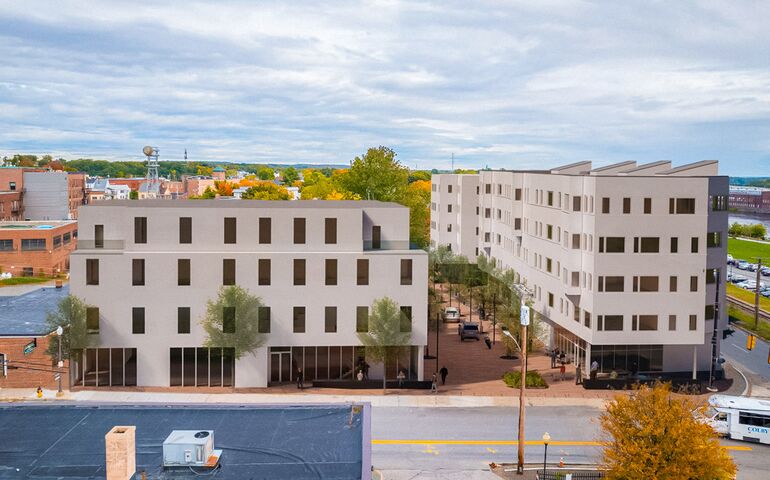 Rendering / Courtesy of Central Maine Growth Council
This is the proposed rendering for the Head of Falls Village project which is expected to be a downtown village with 63 mixed-use apartments.
Rendering / Courtesy of Central Maine Growth Council
This is the proposed rendering for the Head of Falls Village project which is expected to be a downtown village with 63 mixed-use apartments.
For decades, downtown Waterville was in the shadow of the two vacant Lockwood Mill buildings, which have been vacant for several years.
But in recent years, with more than $200 million in combined investment from Colby College, investors and small businesses, with help from tax incentives, the downtown is undergoing a major transformation.
“Our collaboration with the city of Waterville is breathing new life into Main Street and shaping the city’s future,” says Brian Clark, vice president of planning at Colby College. “It’s been an exceptional partnership and we’re looking forward to continuing to work with the city, civic and business leaders, and the greater community to build on this successful momentum and attract more investments that will position Waterville as a place where people want to live, work and visit.”
In recent years, Colby has invested heavily in the downtown, including the 100,000-square-foot Alfond Commons mixed-use building, buying and renovating several other buildings and opening the Lockwood Hotel.
The Lockwood Hotel, with 53 guest rooms and a restaurant known as Front & Main, opened to guests in August 2022. The $26 million hotel was developed by Colby College and is being managed by Charlestowne Hotels, which oversees more than 50 hotels. The hotel is downtown Waterville’s first new hotel in over a century — and builds on the recent development.
Another part of the revitalization project is the Paul J. Schupf Art Center, an $18 million project that opened in December 2022.
Even Lockwood Mills is undergoing changes.
In 2019 the last portions of the mills were bought by North River Co., shortly after it bought the first building within the Lockwood mill complex, which is known as the Hathaway Creative Center, for $20.1 million in 2017. At that time, the acquisition of Hathaway Creative Center, which is a historically revitalized 236,000-square-foot waterfront mixed-use facility, was the fourth-largest commercial property sale in 2017.

“As the southern gateway into the downtown area and a critical link for revitalization between the downtown district and the South End neighborhood, the remaining Lockwood Mill facilities have remained vacant and dilapidated — an eyesore with shattered and boarded-up windows — for several decades,” says Garvan Donegan, director of planning, innovation and economic development for Central Maine Growth Council.
The two vacant mill buildings are now being redeveloped. The four-story, 116,000-square-foot structure and one of two-stories and 56,000-square-feet. The buildings are in a cleanup phase to prepare for the redevelopment into a mixed-use riverfront development that will support workforce housing and commercial spaces.
Phase I is projected to include approximately 65 apartments and around 4,000 square feet of commercial space. According to Donegan, the estimated cost for Phase I of the project is $35 million.
Phase II development will add an additional 80 apartments, resulting in an estimated total of 145 apartments and approximately 4,000 square feet of new commercial space.
A vacant KFC is expected to be demolished and repurposed into parking for the Lockwood Mills residents.
“The revitalization of downtown Waterville highlights the transformative power of strategic investments and community-driven initiatives,” says Donegan. “Through a thoughtful combination of public-private partnerships, historical reflection, and forward-thinking vision, the city is reimagining its main street landscape, embodying progress and cultivating a vibrant community ready for sustained growth and prosperity.”
What’s ahead
One major project in planning is the new construction of Head of Falls Village, a downtown village with 63 mixed-use apartments.
The Head of Falls Village project is a proposed mixed-use development in downtown Waterville that will be market and workforce rate, as well as ground-floor commercial space. The housing units will be a mix of one-bedroom, and two-bedroom apartments.
“Admittedly, our redevelopment plan is very ambitious,” says Todd Alexander, vice president and partner of Renewal Housing Associates LLC, which is developing Head of Falls Village. “But it directly responds to what people have been advocating for in Waterville for decades; downtown revitalization, mixed-use development, high-quality housing choices, vibrant public spaces, and re-establishing a strong link between the downtown and Head of Falls — where this city really all began.”
“The challenge, of course, is that there’s only one way a project like this can only succeed — through a public-private partnership,” he continued. “The private sector needs to take the lead. But government and nonprofits have to participate in order for this to work. One only has to look at the cycle of disinvestment in downtown Waterville from the 1980s to around 2017 to understand that a project of this scale is not financially feasible through the private sector alone.”
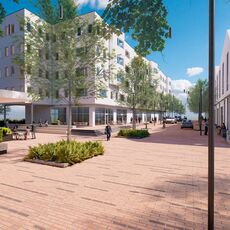
The buildings would be located at the corner of Temple and Front streets, overlooking the Kennebec River. The project is being developed by Renewal Housing Associates and Northland Enterprises Inc. The developers are seeking approval from the city’s Planning Board.
“In our view, Waterville might be one of the few places where a bold redevelopment project like this can succeed,” says Alexander. “There’s a tremendous partnership in place among the public sector, private business and nonprofit organizations. Colby has taken an unprecedented leadership role with its early downtown investments. Members of the community have done the hard work organizing and planning for the change they want to see occur. Spending time here, you can sense the concerted effort and steady progress to simply make Waterville a better place. In that sense, Waterville is exactly the kind of community in which people like me want to invest our time and energy.”
Donegan, says the Head of Falls Village project is expected to be a major catalyst for the revitalization of downtown Waterville. The project will provide much-needed housing and commercial space, and it will help to attract new residents and businesses to the city.
“Now in the early stages of Phase II downtown redevelopment, Waterville’s revitalization continues with a new city center that encompasses art and film centers, the new Lockwood Hotel, culinary diversity and a burgeoning entrepreneurial spirit,” says Donegan. “These impactful initiatives, supported by significant public-private resources, have revitalized downtown Waterville, sparking private sector ventures along the Kennebec River. The upcoming Head of Falls Village development exemplifies this transformative wave, introducing new housing options, enhancements to downtown retail, and innovative shared street designs that promote downtown commerce and collaboration.”
Here is a round-up of other projects in the works
- Plourde Investments LLC, has two projects in the planning phase, including 36-34 Main St., redevelopment of commercial space and 68-70 Main St., redevelopment of commercial space and one new housing unit created.
- Manor Garden is a $6.9 million project comprising 20 townhouse-style units for phase one and an additional 13 units scheduled for phase two. They will be a mix of market rate and workforce-level housing. The development team is Manor Gardens LLC.
Traffic flow
During urban renewal in the 1960s, some historic buildings were torn down and the traffic pattern was made into one-way streets.
For the last two years, Waterville residents and store owners have endured an $11.2 million downtown revitalization, which wound up in November.
The downtown revitalization is a partnership between Colby College, the city of Waterville and the Maine Department of Transportation. The aim is to transform downtown Waterville with economic development, cultural programs and new public spaces. It includes improved walkways, lighting, landscaping and intersections. It also made streets two-way after decades of one-way travel.
A $52.85 million project to replace the Ticonic Bridge started April 3, when day and night lane closures will begin as the Maine Department of Transportation works on the structure that spans the Kennebec River and the Waterville-Winslow town line. The project is being funded in part by a Better Utilizing Investment to Leverage Development (BUILD) grant from the U.S. Department of Transportation for $25 million. The bridge will be closed from November 2024 until April 2025.
Emphasis on the arts
Another key part of downtown revitalization has been the Paul J. Schupf Art Center, an $18 million project several years in the making. It opened its doors in December 2022.
The 32,000-square-foot center, a partnership between Colby College and Waterville Creates, is the home for Waterville’s visual and performing arts, arts education and film and serves as the headquarters of Waterville Creates. It includes the Colby College Museum of Art’s Joan Dignam Schmaltz Gallery of Art.
The center has three state-of-the-art cinemas operated by the Maine Film Center, which brings independent film to Maine and is the only Sundance Art House project cinema in the state. It is also home to the Maine Film Centers’ annual Maine International Film Festival, a 10-day celebration in July that attracts filmmakers and film lovers worldwide. The festival was split between two places and will now be held under one roof.
The center has a 24/7 clay studio with eight pottery wheels and three kilns that are part of the Ticonic + Gallery Studios. Membership for the pottery studio is $130 a month; this includes all supplies but the clay.
Studio 1902 is a rehearsal space for the Waterville Opera House and a flexible space for programs and receptions.
Another center is the Greene Block + Studios, an arts collaborative developed by Colby and operated by the college’s arts office.The $6.5 million project offers arts programming, provides space for interdisciplinary artistic collaborations, and promotes the development of creative work by Maine and national artists, educators, scholars, and students.
Other arts-related projects are planned.
Colby is developing the Gordon Center for Creative and Performing Arts, which will be an addition to the arts ecosystem in Waterville. The $100 million, 74,000-square-foot center is expected to be completed by fall 2023. It is expected to be the most advanced and innovative arts facility in the region and the new home for Colby’s departments of theater, dance, music and the cinema studies program.



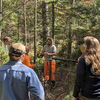

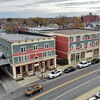

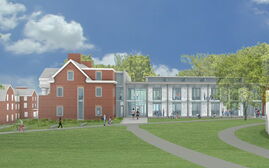

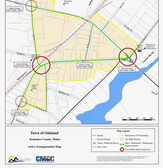




0 Comments